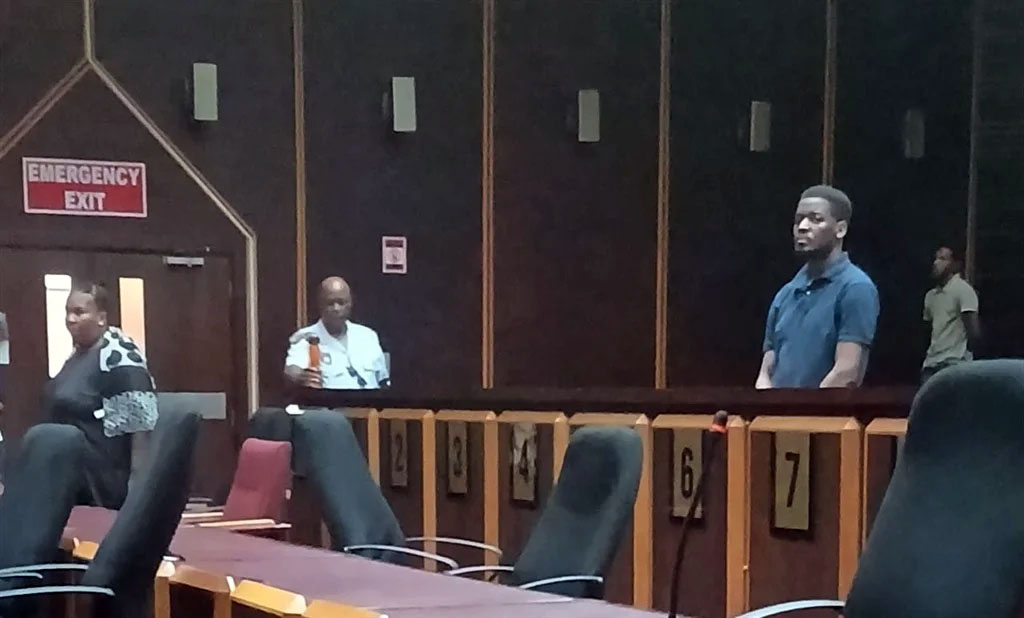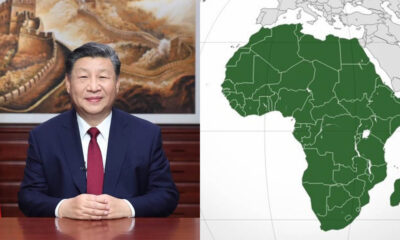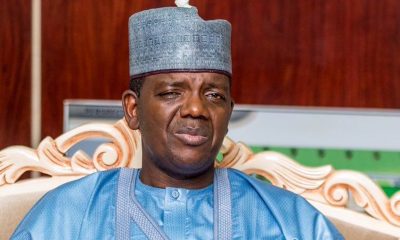Africa
Guinea junta official blames corrupt leaders for Africa’s political instability

Guinea junta official blames corrupt leaders for Africa’s political instability
DANSA Kourouma, president of Guinea’s National Transitional Council (NTC) has blamed political instability in Africa on corrupt and insensitive leaders who conspire with foreign interests to exploit the continent’s rich resources leaving the people impoverished and underdeveloped.
“The issue is Africa’s natural resources, which some foreign countries prefer to deal with undemocratic regimes to exploit,” said Kourouma, Guest Speaker at the Chatham House London, a leading British policy Think-tank, on 30th August 2023.
Kourouma, 43, a medical doctor and civil society activist, could be described as Guinea’s de facto Prime Minister following his appointment in January 2022 to lead the 81-member legislative Council in the aftermath of the September 2021 coup led by Col. Mamady Doumbouya, that toppled elected President Alpha Conde.
Explaining the nexus between economic development and political stability, Dr Kourouma urged continental organisations such as the African Union and the Economic Community of West African States (ECOWAS), to review their engagement and intervention strategies on economic management to avoid political crises.
For instance, he argued that ECOWAS was set up for economic integration, insisting that the original objective must take precedence over political integration.
READ ALSO:
-
JUST IN: FG to shutdown Murtala Mohammed Int’l Airport temporarily
-
Tanker driver crushes 16-year-old girl to death in Niger
-
Internet fraud: EFCC returns $26,000 to British national
“ECOWAS should be restructured to effectively tackle issues related to economic infrastructure, as well as unemployment and illiteracy” affirmed Kourouma, who was accompanied by other Guinean officials including the country’s Ambassador to Britain Aly Diallo.
On election, which is a major cause of political crisis and instability in Africa, Dr Kourouma said the “political class must realise the power of the youths, who have mastered the technology of all aspects of the electoral process.”
The Doumbouya coup followed discontent and disaffection that greeted Conde’s ill-advised decision to change Guinea’s constitution through disputed referendum for his controversial third term project in 2020.
At the Chatham House event anchored by Dr Alex Vines, Director, Africa Programme, and attended by diplomats, researchers as well as security and governance experts, Dr Kourouma outlined the 10-element transition programme of the NTC.
The highlights are conducting two types of population census, preparing an electoral register, a new constitution, setting up an electoral body, and conducting elections (referendum, local, legislative, and presidential), culminating in the handover of power in 2025.
The 24-month transition timetable, which started in January 2023, was a compromise between the junta which had wanted a three-year programme and ECOWAS, which condemned the coup and had given the junta six months to restore constitutional order.
Asked if the junta would not go back on its words to seek further extension, Dr Kourouma said: The transition is difficult, there might be some delays, but we are on course.”
He said the NTC was working hard to deliver a credible voter’s role, through an electoral body with integrity, because previous elections in the country lacked transparency and did not reflect the will of the people.
“Our mission is to restructure the institutions to ensure that the more than one billion dollars realised from mining annually is accounted for,” the NTC President said.
On the Euro 600 million budgeted for the transition programme, he explained that no amount was too much for political stability in a Bauxite-rich Guinea.
READ ALSO:
-
Gabon coup leaders name Gen Brice Oligui Nguema as new leader
-
Armed policemen storm Wale Adedayo’s council in Ogbere
-
BREAKING: Councillors suspend Ogun LG chairman who accused Abiodun of funds diversion
Dr Kourouma disclosed that the country was currently using its internal revenue and had not received any external financial support for the transition programme.
A Steering Committee, monitoring the transition implementation is made up of local and international stakeholders, such as ECOWAS and development partners, with former Benin Republic’s former President Yayi Boni, who has undertaken several missions to Conakry in his capacity as the ECOWAS Mediator on the Guinea crisis.
Dr Kourouma said the regional bloc has a responsibility to rally international support for the effective implementation of the transition programme for a seamless restoration of constitutional order in Guinea.
The NTC comprises representatives of Guinea political parties, civil society, armed forces, employers’ organisations, trade unions and other interest groups, including farmers.
Its role as a legislative body in the absence of a parliament is crucial to the implementation of the transition programme.
Dr Kourouma told the Chatham House audience that Guinea under the present military regime was making progress on governance issues, including by freeing all political detainees, adding that any politician or former public office holder aboard was free to return home.
The regime is also promoting human rights, the rule of law and press free freedom, he added.
Three of the four ECOWAS countries currently under military dictatorships are Mali, Burkina Faso and Niger. Like Guinea, Mali and Burkina Faso are also implementing different transition programmes.
With Africa facing “military coup contagion” or “domino effect,” political leaders and the armed forces owe the citizens the constitutional obligation to play their part in line with international best practices in governance systems to ensure that Africa’s resources are used for its development and prosperity of its more than 400 million long-suffering people.
*Paul Ejime is a Global Affairs Analyst and Consultant on Peace & Security and Governance Communications
Guinea junta official blames corrupt leaders for Africa’s political instability
Africa
Nigeria denies alleged plot to destabilise Niger Republic

Nigeria denies alleged plot to destabilise Niger Republic
The Federal Government of Nigeria has refuted “in very strong terms” allegations that it is plotting to destabilise neighbouring Niger Republic.
The Nigerien authorities alleged that the Lakurawa terrorist group, with the help of foreign security forces, including Nigerian security forces, were responsible for the attack on the Niger-Benin oil pipeline on December 13, 2024, in Gaya, Dosso Region of Niger Republic.
However, Nigeria, the Ministry of Foreign Affairs, in a statement on Saturday signed by its acting spokesperson, Kimiebi Imomotimi Ebienfa, refuted the allegation.
“The Government of Nigeria condoles with the Government of Niger over the unfortunate attack on the oil pipeline, but informs that the perpetrators were neither backed nor assisted by Nigerian authorities.
READ ALSO:
- Navy arrests 19 Nigerians attempting to reach Europe by hiding on ship
- Troops arrest four Ambazonian rebels in Taraba
- NIMC warns against extortion, reaffirms free NIN enrollment
“The Government of Nigeria is strongly committed to the fight against terrorism and will not condone or support the activities of such groups.
“The Federal Government of Nigeria also expresses very serious concern and states categorically that there are no French military troops in the northern part of the country preparing to destabilize the Government of Niger.
“These allegations are unfounded and should be discarded in their entirety,” the Statement read in part.
It also noted that the relationship between Nigeria and France had always been cordial, saying it is guided by mutual respect, dignity, and non-interference in each other’s internal affairs.
The government of Nigeria assured that it would continue to explore all peaceful means to maintain its cordial relationship with the Republic of Niger for the benefit of the people of both countries.
Nigeria denies alleged plot to destabilise Niger Republic
Africa
Suspected witchdoctors arrested over attempt to ‘bewitch’ Zambia’s President

Suspected witchdoctors arrested over attempt to ‘bewitch’ Zambia’s President
Two men were detained in Zambia on charges of being “witchdoctors” tasked with attempting to bewitch the president.
The police stated they had arrested Jasten Mabulesse Candunde and Leonard Phiri in Lusaka.
“Their purported mission was to use charms to harm” President Hakainde Hichilema, according to the police statement issued on Friday.
Many individuals in the southern African country believe in and dread witches.
The police stated Mr. Candunde and Mr. Phiri were hired by Nelson Banda, MP Emmanuel “Jay Jay” Banda’s younger brother.
The MP was reportedly arrested last month in nearby Zimbabwe on robbery allegations, which he denies, but he has not been seen in public since.
He is also accused of escaping from detention in August while waiting to appear in court.
The opposition Patriotic Front (PF), led by z, has previously claimed that the charges are politically motivated.
READ ALSO:
- Farotimi: Advocacy group wants UK college to break ties with Afe Babalola
- Yahaya Bello walks home after release from Kuje prison Friday evening
- Fire kills family of three in Ibadan
Emmanuel Banda, who has been an independent MP since 2021, previously worked with Lungu, who lost the presidency to Hichilema that same year.
The police stated the MP’s younger brother, Nelson, was “currently on the run” in their statement.
Mr. Candunde and Mr. Phiri face charges under Zambia’s Witchcraft Act for “possession of charms,” “professing knowledge of witchcraft,” and “cruelty to wild animals.”
The pair was found with “assorted charms,” including a live chameleon, according to the authorities.
According to the police statement, they claimed they had been given more than 2 million Zambian kwacha (£58,000; $73,000) for their “mission.”
The accused are in jail and will appear in court “soon,” according to the police, although no specific date has been set for the hearing. They have not yet responded in public to the charges.
Suspected witchdoctors arrested over attempt to ‘bewitch’ Zambia’s President
Africa
South African man sentenced to six life terms for killing his relatives

South African man sentenced to six life terms for killing his relatives
-

 Railway1 day ago
Railway1 day agoLagos Rail Mass Transit part of FG free train ride – NRC
-

 metro13 hours ago
metro13 hours agoWhy we displayed ‘Jesus Christ is not God’ banner at Lekki mosque -Imam
-

 metro2 days ago
metro2 days agoCourt stops customs from seizing imported rice in open market
-

 metro3 days ago
metro3 days agoIbadan stampede: Tinubu orders probe as death toll hits 40
-

 metro2 days ago
metro2 days agoIbadan stampede: Ooni reacts after arrest of ex-wife
-

 metro1 day ago
metro1 day agoNIMC warns against extortion, reaffirms free NIN enrollment
-

 metro3 days ago
metro3 days agoAfe Babalola: Court grants Dele Farotimi bail, barred from media interviews
-

 News3 days ago
News3 days agoAdebayo Ogunlesi, 2 other Nigerians make Forbes 50 wealthiest Black Americans list 2024













